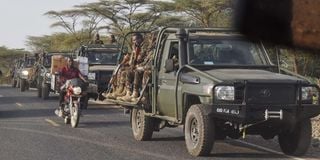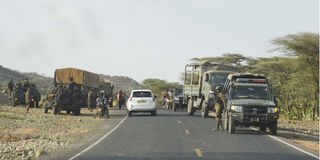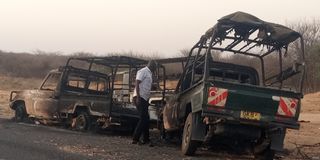Premium
Bandits now use guerrilla tactics to counter military, police

Kenya Defence Forces (KDF) vehicles ferrying soldiers in a convoy at Marigat in Baringo County on February 17, 2023.
Bandits in regions declared as disturbed and dangerous in the Kenyan North are now employing guerilla tactics to counter military and police offensives in the region, it has been established.
The tactics have become a depressing pattern for both the police and Kenya Defence Forces (KDF) troops, who are on assignment to crack down on and neutralise the bandits’ activities in the region.
The last week has seen the bandits stage retaliatory attacks in Turkana, Samburu, and Baringo counties, after reports from residents of the military bombing of their hideouts.
The joint military/police force is facing a nightmare in its effort to trace the criminals, who keep launching deadly attacks when least expected.
In Samburu county, residents told Nation.Africa that armed bandits in groups of two or three, often launch quick-fire attacks across villages and drive away animals. The bandits are said to have a "structured command" where they execute twin attacks simultaneously.
“They are not a gang as they used to be previously,” a local police reservist told Nation.Africa.
“They always move in manyattas (homesteads) in pairs. The two will be attacking village A in the west, while another two or three will be in village B simultaneously in a different direction,” he said on condition of anonymity due to security reasons.
This makes it difficult for security troops to respond to the attacks, having been launched in a guerilla style.
Surprise attacks
Guerrilla combat involves the use of military tactics such as surprise attacks and ambushes, raids, hit-and-run and sabotage of vulnerable targets, among others, to fight a larger military force.
In Baringo County, bandits carried out a daytime retaliatory attack in the volatile Seretion village in Mochongoi ward, Baringo South on Sunday, injuring a police reservist and making off with more than 200 head of livestock.

Kenya Defence Forces (KDF) soldiers in a convoy at Marigat in Baringo County on February 17, 2023. A security operation involving the soldiers and police to flush bandits out of the disturbed Kerio Valley region is on.
This was after the joint military-police teams deployed to carry out disarmament in the area bombed the Korkoron and Tandar Hills on Friday morning in a bid to smoke out the bandits. The hills are among the bandits’ hideouts in the region.
In Samburu’s Saturday twin attacks where four people, including two children, were killed, it has been established the attacks were launched simultaneously. Three bandits reportedly attacked Marti village killing two children before driving away livestock. At the same time, witnesses said, two bandits attacked Lolmolok area and killed two herders before driving away goats from the grazing field.
The bandits are also targeting security troops.
In Samburu, the bandits have turned Malaso and Kur Kur valleys into their "operation territory" as they continue to mount attacks in the entire Lorroki division of Samburu West.
Whenever the gun-slinging criminals attack villages in the region, they often drive livestock down the valley, making it impossible for security troops to trace them. The Malaso and Kur Kur valleys are deceptively picturesque from a distance, but beneath them is a bandits' haven.
The edges of the Rift Valley connecting the Suguta Valley shared in Turkana and parts of Baringo have poor accessibility. The terrain is sharp, rocky and mountainous with thorny shrubs and cacti.
Colonel (Rtd) Moses Kwonyike has attributed the boldness of the armed criminals to elders who perform ritual ceremonies, where organised bandits are intentionally charged and adjured by traditional leaders.
The elders, who involve seers and magicians are highly respected and held in high esteem in the Pokot community, owing to the roles they play in the community.
Their roles are distinct, with seers and magicians, commonly referred to as werkoi and kapolok respectively, playing different tasks.
Elders' predictions
According to the retired soldier, the elders are believed to predict what will happen through the study of animal intestines, and they can purportedly tell what the bandits will experience when they go out on a raid.
With no relief in sight for residents of troubled regions, North Rift MPs now want the military to fully take charge of the security operation to smoke out bandits in the troubled and dangerous areas in the region, saying the current arrangement is not bearing fruit.
The MPs have tasked the Interior and Defence ministries to seek parliamentary approval to allow the KDF to take full charge of the ongoing police-led security operation in the banditry-prone region, saying attacks continue unabated.
According to the MPs, the heavy security presence has served no purpose because soldiers are being commanded by police, who have proved no match for the wily bandits.

Burnt police vehicles at KWS hotspot area on February 15, 2023, where four police officers were killed and seven injured by bandits.
“We want military deployment under Article 241(3) of the Constitution. We cannot deploy KDF to the region only to be told they are under police. This is a very unfortunate statement from the government since the bandits are reigning supreme in the region,” said Marakwet West MP Timothy Toroitich.
The legislators spoke in Keiyo South, Elgeyo Marakwet, as bandits staged more retaliatory attacks in Turkana and Baringo counties, amid unconfirmed reports of tensions within the multi-agency security teams executing the operation to flush out bandits, which could be affecting the assignment.
“The deployment of KDF must be real and not cosmetic. We are yet to see any fruits of the deployment,” Mr Toroitich said, noting that lives must be protected.
The Constitution allows the deployment of KDF to restore peace in any part of the country affected by unrest or instability only with the approval of the National Assembly.
Deployment defense
Interior Cabinet Secretary Kithure Kindiki and his Defence counterpart Aden Duale last Thursday defended the deployment of KDF troops to the troubled region without prior approval by MPs.
The two said the military was dispatched to back up the National Police Service, adding that the operation was under the command of the Inspector General of Police Inspector Japhet Koome.
“We will come back to Parliament for approval of the fully-fledged deployment of KDF if we feel the need. For now, we are cooperating with the National Police Service,” said the Defence CS when he appeared before the joint parliamentary committee.
On Monday, Samburu West MP Naisula Lesuuda said the ongoing banditry in the region is a fatal expansion of land territory. The legislator expressed anger over the perennial attacks in her constituency that have left more than 10 people dead in one week.
Ms Lesuuda claimed the armed bandits believed to be from neighbouring Baringo County want to displace residents occupying Loosuk, Longewan, Pura, Lkeek Sapuki, and other parts of Samburu West.
The MP said the attacks in her constituency are now a concern "because it is no longer about livestock raiding”.
"This has now become a song and is clear that it is no longer about the livestock. These people want our land. They have now displaced people and families are running away. It is sad," the MP said.
"They have already occupied villages where our people have left and are grazing and quenching their animals. This is happening even when the troops are in these affected areas," she added.
Read: Four more killed in Samburu as bandits continue to terrorise locals
Ms Lesuuda said the security operation is yet to be felt as lives were still being lost and people were being displaced from their homes and livestock were driven away, even in broad daylight.
"The fact on the ground is that these bandits are so daring to the extent they are turning their guns on security troops of the calibre of KDF," she said.
The scale of the bandits’ insurgency in the region has long been clear with the horrible deaths of hundreds of people including police officers, mirroring just how bad the insecurity has become in the troubled region.
But the government insists it is ready to confront gunmen to confiscate weapons from them and end the constant cattle rustling in Samburu and other parts of the Rift Valley.
So far, incessant deadly attacks in the region by armed bandits have had more than 1,600 people displaced from remote areas and more than 100 lives lost, including security officers.
More than 10 schools have been closed, with learners staying away for their safety.
A contingent of formidable forces is on the ground to restore normality in parts of Samburu, Turkana, and Baringo counties, affected by the recent spate of banditry activities.
The forces are drawn from the KDF, General Service Unit, Anti Stock Theft Unit, and National Police Reservists.







